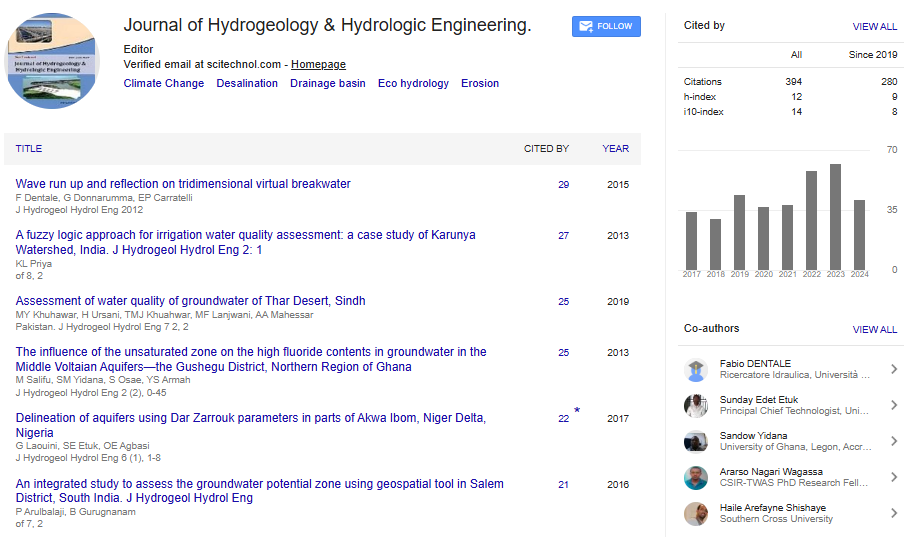Commentary, J Hydrogeol Hydrol Eng Vol: 13 Issue: 2
Flowing Solutions: Revitalizing Urban Water Systems for Sustainable Futures
Karina Meredith*
Department of Civil Engineering and Environmental Science, University of Iowa Lowa City, USA
*Corresponding Author: Karina Meredith,
Department of Civil Engineering and
Environmental Engineering, University of Iowa, Iowa City, USA;
E-mail: meredithk@gmail.com
Received date: 27 March, 2024, Manuscript No. JHHE-24-138803;
Editor assigned date: 29 March, 2024, PreQC No. JHHE-24-138803 (PQ);
Reviewed date: 12 April, 2024, QC No. JHHE-24-138803;
Revised date: 19 April, 2024, Manuscript No. JHHE-24-138803 (R);
Published date: 26 April, 2024, DOI: 10.4172/2325-9647.1000318
Citation: Meredith K (2024) Flowing Solutions: Revitalizing Urban Water Systems for Sustainable Futures.k. J Hydrogeol Hydrol Eng 13:2.
Description
Urban water systems are the lifeblood of cities, sustaining millions of lives while driving economic growth and societal development. However, as urbanization accelerates worldwide, these systems face unprecedented challenges, from water scarcity to pollution and aging infrastructure. Addressing these challenges requires innovative approaches that ensure the flexibility, efficiency, and sustainability of urban water management.
One of the primary concerns in urban water management is ensuring an adequate supply of clean water. Rapid urbanization strains existing water sources, leading to scarcity and competition among residents, industries, and agriculture. Sustainable solutions such as rainwater harvesting, groundwater recharge and water recycling can help mitigate these challenges by diversifying water sources and reducing reliance on finite freshwater reserves.
Furthermore, the quality of urban water bodies is increasingly under threat from pollution, including industrial discharge, agricultural runoff, and untreated sewage. Contaminated water not only poses health risks to urban populations but also risk aquatic ecosystems and biodiversity. To safeguard water quality, cities must invest in robust wastewater treatment infrastructure, implement stringent regulations on pollutant discharge, and promote public awareness and participation in water conservation efforts.
The sustainability of urban water systems also jionts on the efficient management of water resources. Leakages in aging pipelines, inefficient irrigation practices, and excessive water consumption exacerbate water scarcity and strain municipal budgets. Deploying smart technologies such as sensors, meters, and real-time monitoring systems can enable cities to optimize water distribution, detect leaks promptly, and incentivize water conservation behaviors among consumers.
Moreover, climate change presents a looming threat to urban water systems, with rising temperatures, altered precipitation patterns, and more frequent extreme weather events disrupting water availability and exacerbating flood risks. Adaptation measures such as green infrastructure, storm water management systems, and nature-based solutions can help cities build flexibility against climate-induced water challenges while enhancing urban aesthetics and biodiversity.
In addition to technological innovations, fostering interdisciplinary collaboration and stakeholder engagement is essential for effective urban water management. Governments, businesses, civil society organizations, academia, and local communities must work together to co-design and implement holistic water strategies that balance competing interests, ensure equity in access to water services, and promote social and environmental justice.
Furthermore, investing in water infrastructure and management not only generates economic benefits but also creates employment opportunities, stimulates innovation, and enhances urban livability. Green jobs in water-related sectors, such as water treatment, infrastructure development, and conservation, can contribute to inclusive economic growth and poverty alleviation while advancing environmental sustainability goals.
Ultimately, achieving sustainable urban water management requires a paradigm shift in how we perceive, value, and manage water resources. By embracing innovation, collaboration, and complete approaches, cities can transform their water systems into spirited, equitable, and thriving ecosystems that support the well-being of present and future generations.
Conclusion
Stimulating urban water systems is not merely a technical challenge but a moral imperative and an economic opportunity. By investing in sustainable water management practices, cities can ensure water security, protect public health, temporary economic prosperity, build strong communities capable of thriving in the face of environmental uncertainty. The time to act is now, for the future of our cities cities depends on the choices we make today.
 Spanish
Spanish  Chinese
Chinese  Russian
Russian  German
German  French
French  Japanese
Japanese  Portuguese
Portuguese  Hindi
Hindi 
